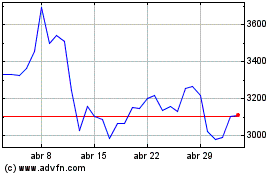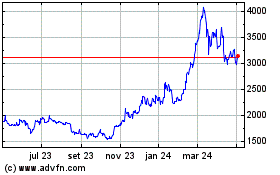Bitcoin and cryptocurrencies rebound after positive economic data
and ETFs impact
Bitcoin’s price (COIN:BTCUSD) reached a peak of $61,720 during
Asian trading before retreating to just over $60,220 within 24
hours. This recovery followed lower-than-expected jobless claims,
calming investors and leading to a market-wide rebound after
Monday’s sharp decline. Additionally, the recovery mirrored the
positive performance of U.S. stocks, especially in the S&P 500
and Nasdaq 100, with record inflows into Bitcoin ETFs aiding the
swift rebound above $60,000. Despite the recent rise, Bitcoin is
down -7.9% over the last 7 days.
Ether (COIN:ETHUSD) hit an intraday high of $2,708.87, pulling
back to $2,586.54 at the time of writing, with a weekly loss of
-19.17%. Toncoin (COIN:TONCOINUSD) continues its upward trend
following its Binance listing and integration with IntoTheBlock,
rising 8.6% in the last 24 hours. Solana (COIN:SOLUSD) fell 6% in
the last 24 hours to $153.20.
Bitcoin reaches $125 trillion transaction milestone
On August 8, the cumulative total on-chain transaction volume of
Bitcoin in fiat terms reached $125 trillion, up from $114 trillion
at the start of the year. The growing quarterly transaction volume
in 2024 was $4.6 trillion in Q1 and $4.3 trillion in Q2,
highlighting Bitcoin’s increasing role in the global financial
system. Bitcoin has processed $8.9 trillion in transactions so far
in 2024.
Bitcoin and ether ETFs in the US: positive flows for bitcoin,
outflows for ether
On Thursday, spot Bitcoin ETFs in the U.S. received $192.56
million in positive flows. BlackRock’s ETF (COIN:IBITUSD) led with
$157.6 million, followed by WisdomTree (AMEX:BTCW) with $118.52
million in inflows. Grayscale’s Bitcoin ETF (AMEX:GBTC) faced net
outflows of $182.94 million.
In contrast, Ether ETFs saw net outflows of $2.87 million, with
BlackRock’s ETF (NASDAQ:ETHA) recording $11.74 million in inflows,
while Grayscale Ethereum Mini Trust (AMEX:ETH) and Fidelity
Ethereum Fund (AMEX:FETH) recorded outflows of $19.8 million and
$2.6 million, respectively.
Trump Jr. distances family from memecoins and plans DeFi platform
to tackle banking inequality
Donald Trump Jr. announced plans to launch a cryptocurrency
platform focused on decentralized finance (DeFi) to address
inequality in banking access. He emphasized that this is not a
memecoin but a substantial initiative, though still in early stages
without a defined timeline. Trump Jr. noted that the platform aims
to challenge the traditional banking system.
During a broadcast on Rumble, Trump Jr. denied any family ties
to memecoins, stressing the focus on a more substantial and
long-lasting financial project. He highlighted Bitcoin’s potential
to combat the Fed and suggested that the project could challenge
the current banking sector, possibly using blockchain technology to
address financial inequalities. He warned against fake tokens
claiming association with the Trump family.
Tether USDT milestone and new projects
Tether (COIN:USDTUSD) reached a new milestone by issuing over
$115 billion, highlighted by CEO Paolo Ardoino, coinciding with
Bitcoin’s recovery to $62,000. With expansion plans, Tether aims to
grow its team to 200 employees by mid-2025, focusing on the
compliance sector. This move seeks to enhance monitoring against
illicit activities in secondary markets using advanced
technologies. Despite having a relatively smaller team than other
major players, Tether reported record profits of $5.2 billion in
the first half of 2024.
Additionally, Tether is promoting blockchain education through a
partnership with the Africa Blockchain Institute to train students
in Ivory Coast, equipping them for the digital economy.
Regarding the EU’s MiCA regulation, Paolo Ardoino expressed
concerns about potential systemic risks to stablecoins and the
banking system. He criticized the requirement to keep 60% of
reserves in EU banks, pointing to vulnerability to bank runs, as
evidenced by the collapse of Silicon Valley Bank, which impacted
USD Coin.
Ripple begins testing stablecoin on Ethereum and XRP ledger
Ripple (COIN:XRPUSD) has started testing its stablecoin, Ripple
USD, on the Ethereum and XRP Ledger networks. In its beta phase,
the token is being rigorously evaluated by business partners to
ensure high security and efficiency before regulatory approval.
Ripple aims to compete in the $160 billion stablecoin market, using
U.S. Treasuries and dollar deposits as collateral. The stablecoin
is not yet available for trading.
SEC delays decision on Nasdaq cryptocurrency ETF
The U.S. SEC needs more time to decide on the listing of the
Hashdex Nasdaq Crypto Index ETF on Nasdaq. If approved, this ETF
would be the first to diversify into cryptocurrencies and altcoins
in the U.S., tracking the Nasdaq Crypto US Index, which includes
Bitcoin (COIN:BTCUSD) and Ether (COIN:ETHUSD), as well as altcoins
like Chainlink (COIN:LINKUSD) and Uniswap (COIN:UNIUSD). Approval
has not yet been granted, and the SEC has not authorized options in
Bitcoin or Ether ETFs.
OKX CEO warns of risks with Tornado Cash
Star Xu, CEO of OKX, warned users about the risks of using the
sanctioned cryptocurrency mixer Tornado Cash. On August 9, Xu
emphasized that deposits or withdrawals to sanctioned entities
could lead to account suspension due to OKX’s strict compliance
policies, which follow U.S. sanctions. The company stated that it
does not provide services to sanctioned individuals or
entities.
Coinbase criticizes CFTC proposal on event contracts
Coinbase (NASDAQ:COIN) criticized the U.S. Commodity Futures
Trading Commission (CFTC) for a proposal that would ban certain
event contracts, such as political betting. Chief Legal Officer
Paul Grewal argued that the proposal has problematic definitions
and ignores the public benefits of these markets, urging the CFTC
to withdraw the proposal and collaborate with stakeholders to
create a more balanced and innovative approach.
Solana fixes critical vulnerability before public disclosure
On August 9, participants in the Solana ecosystem, including
developers and validators, fixed a critical vulnerability in the
network before disclosing it to the public. The fix was securely
coordinated and swiftly applied to prevent potential disruptions.
The vulnerability was revealed after 70% of the network was
updated, ensuring the blockchain’s protection. Previously, Solana
faced criticism for network outages, highlighting the importance of
this preventative fix.
Alameda Research transfers Worldcoin tokens to Binance
Alameda Research, a company associated with the bankrupt FTX,
transferred 205,387 Worldcoin tokens (COIN:WLDUSD) to Binance,
valued at $352,000, marking the first movement since receiving them
in September 2023. Alameda still retains significant digital
assets, including 24.8 million WLD.
Vitalik Buterin transfers $8 million in ether to new wallet
Vitalik Buterin, co-founder of Ethereum (COIN:ETHUSD),
transferred 3,000 ETH, valued at over $8 million, to a new
multi-signature wallet. The movement suggests a possible donation,
according to Lookonchain. Buterin has a history of making large
cryptocurrency donations, including $1.2 billion to the Indian
Covid-Crypto Relief Fund in 2021, highlighting his active role in
crypto philanthropy.
Santa Monica announces Bitcoin festival
Santa Monica’s Bitcoin Office will host an open-source festival
on October 18, focusing on Bitcoin mining, investment, and economic
impacts. The event, in partnership with the Proof of Workforce
Foundation, aims to educate the community and stimulate local
economic recovery. Recently launched, the office seeks to support
economic development and attract investment.
Challenges and potential of Hong Kong virtual banks
Hong Kong’s virtual banks face significant challenges, capturing
only 0.3% of retail banking assets. Johnny Ng Kit-chong, a
cryptocurrency advocate, believes they could boost the Web3 sector,
but the difficulty in opening accounts for cryptocurrency and
blockchain companies is a barrier. Mox Bank, a pioneer in
cryptocurrency ETFs, plans to expand into emerging sectors. Ng
proposed integrating Bitcoin into Hong Kong’s fiscal reserves for
inflation protection and economic strengthening.
Turkey sees surge in crypto company license applications
Turkey is experiencing a significant increase in cryptocurrency
companies seeking licenses following the introduction of new
legislation. The Turkish Capital Markets Board (CMB) received
applications from 47 companies, including Bitfinex and Binance TR.
The “Law on Amendments to the Capital Markets Law” took effect on
July 2, establishing a regulatory framework for crypto assets.
Exchanges like Coinbase and Bybit have yet to apply for
licenses.
Thailand launches regulatory sandbox for cryptocurrencies
Thailand’s Securities and Exchange Commission (SEC) launched the
Digital Asset Regulatory Sandbox on August 9, creating a flexible
regulatory space to test cryptocurrency services. This sandbox
allows companies to experiment with new solutions in a controlled
environment, promoting innovation in the capital markets.
Participants must meet strict criteria and can apply for an
extension of the testing period, which initially lasts up to one
year.
Ethereum (COIN:ETHUSD)
Gráfico Histórico do Ativo
De Dez 2024 até Jan 2025

Ethereum (COIN:ETHUSD)
Gráfico Histórico do Ativo
De Jan 2024 até Jan 2025
